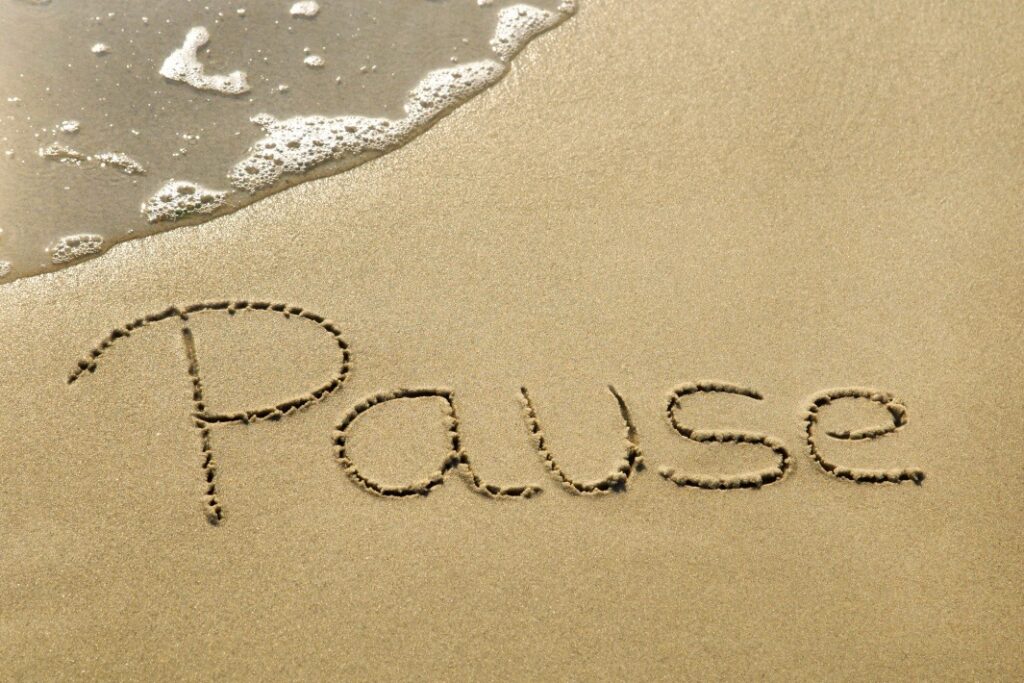The Potential for Change in One Short Pause
One short pause might hold potential for a big transformation. By not instantly reacting to a situation and instead, taking your time to be fully present with your feelings, you free yourself to shift perspective. That shift might be a profound one.
If something doesn’t feel right, a short pause can help you recognize why. Then, you can make a conscious decision instead of responding automatically as you normally would. You might have a pattern of walking away from a relationship when it becomes boring to you, or you might leave a therapist or a doctor because you’re not comfortable with them and you don’t quite know why. By taking a pause to reflect, you can avoid leaving one situation only to find you end up in a similar one, feeling just as uncomfortable as you were the last time and about to fall into the old habit of leaving with fingers crossed that these circumstances won’t show up again. Too often, you’ll find that they will—which is why it’s important to recognize the potential for change in one short pause.
An Opportunity for Reflection
A pause gives you a chance to reflect not just on what happened and what others did but on your own choices. Were they the only choices you could have made? And if not, why didn’t you make a different choice? What was your decision-making process? Is it a process that works well for you in some situations but not others?
Often, people get into the habit of blaming other people or blaming situations for their unhappiness but don’t look at their own role. Taking a short pause to self-reflect can help with identifying behavior patterns that keep leading to the same unsatisfying outcomes. Ask yourself, “What role did I play, however small, in bringing about an outcome I didn’t like?”
“The Pause That Refreshes”
A short pause can also be used to refresh yourself and change your mood, outlook, and energy. When you’re feeling frazzled, you can take a short pause to focus on your breathing, slowly inhaling and exhaling while tuning into the sensation of your breathing. By breathing in for four counts, holding your breath for seven, and exhaling for eight counts—that is, using the 4-7-8 breathing technique created by Dr. Andrew Weil—you cue your parasympathetic nervous system to activate and relax you, helping you release any anxiety. By letting go of fear and worry, you can shift into a more optimistic and hopeful mood, particularly if you also use the short pause to assert something positive. For example, you could say to yourself, “This too shall pass,” or “I’ll be okay. I know I will.” Continue taking short pauses in this way and you might find you’re developing a new habit of being more positive about your present and future.
You can also take a short pause to connect with nature, even if just in your own mind. Picture a place in nature and imagine yourself there, immersed in the sensory experience as you watch the sun set or rise or observe the wind rippling the surface of a pond or lake. If you can go outside into nature, take a short pause to observe a bee drawing nectar from a flower or the movement of a creek as it tumbles over rocks. A few minutes in nature reduces levels of the stress hormone cortisol, giving your body and spirit a break. In that moment, you might come to recognize that you are under a lot of stress lately and need to take time out to relax. You might realize you need to get out into nature more often and let it soothe you. Time in nature can strongly support mental wellness, so taking a short pause to reconnect with the earth and her elements, creatures, and plants can start you on the road to greater wellness.
Relive a Happy Memory
You could also take a short pause to relive a happy memory that may have a similar effect to enjoying a moment in nature. What memory brings a smile to your face? Take time now to remember it. If you want to live a happier life, could taking short pauses to remember moments of joy help you achieve that goal? What if anything can you learn from that memory? Did you do something that gave you joy but that you haven’t done lately because you’ve been too busy to focus on what relaxes you and makes you happy? If that’s the case, you can make a conscious choice to do something that will create a happy memory.
Brighten Someone’s Day
Then too, you can take a pause to make someone else feel seen and valued. My grandfather used to say to me when I was a boy, “Carl, it doesn’t cost a nickel to say hello.” He would smile and greet strangers all the time. Following his example, I often smile at or say hi to strangers and am open to what happens. Some would say that doing this can invite problems, but my experience is that it usually brings a smile to their face and also makes me feel good. Perhaps in a small way, I’ve made a difference in that person’s day.
You could also choose to take a short pause to say something complimentary or express gratitude to someone and see what that feels like. Maybe it will help you to feel more grateful for what you have—including the ability to affect others in a positive way.
Short Pauses Can Make a Difference
What I’m describing are small moments in which you hit the refresh button and open the possibility to change. Big journeys start with just one small step, as the saying goes, and big transformations can begin with one small choice. A habit doesn’t change itself. Taking a short pause to shift out of your automatic mood or response one time may not lead to big, dramatic changes, but then again, it has been known to happen. That “aha” moment when you have a realization can be exactly what you need to start on a new course.
And even if your own short pause seems only to make a small difference in your life today, it could be the beginning of a new habit that you consciously work to establish—a habit of being more observant, of being more mindful of how much stress you take on, of being more connected to other people, or something else.
Hit pause and tap into your potential for transformation.
A version of this article appeared in Inner Self magazine.

You can learn more about transformation and how to change your story and your life by reading my books, including my newest book, Go Within to Change Your Life. They’re available at bookstores everywhere.

Carl
Carl Greer, PhD, PsyD, is a retired clinical psychologist and Jungian analyst, a businessman, and a shamanic practitioner, author, and philanthropist funding over 60 charities and more than 2,000 past and current Greer Scholars. He has taught at the C.G. Jung Institute of Chicago and been on staff at the Replogle Center for Counseling and Well-Being.
Sign up for announcements
Receive the latest announcements from Carl Greer and a FREE e-Book: 8 Steps to Change Your Life by Creating a New Story.
